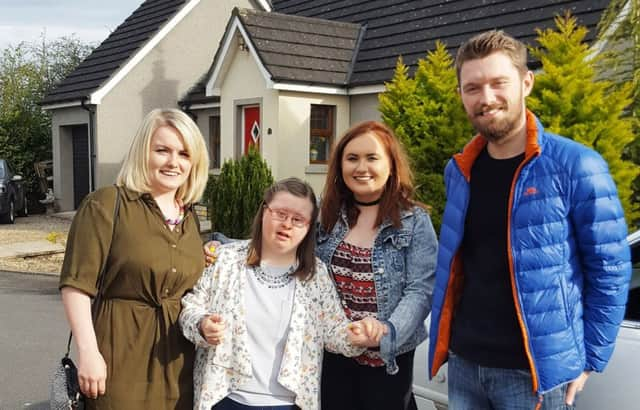'˜Having a sister with Down's Syndrome has enriched our lives'


I knew she found it harder to talk, was slower at running and did not go to the same school as the rest of us, but Rachel was my sister and that was how she was.
It wasn’t until I was around 10 years old that I began to understand that Rachel had Down’s syndrome and I started to realise the implications this had on her and the rest of our family.
Advertisement
Hide AdAdvertisement
Hide AdAs we have grown up, Rachel has had to overcome difficult times that the rest of her siblings have not had to experience. She has had to work at things that we have taken for granted.
As a small child, Rachel had major heart surgery. She had a difficult transition when she left school and has not been able to have the same social experiences that my other brother, sister and I have had.
While each family’s experiences are different, I know that having a sister with Down’s syndrome has enriched our lives and filled our house with much love and laughter.
Rachel loves her life and has a wicked sense of humour. Just like any other family, there have been hard times and undoubtedly moments have been difficult for my parents, but it is impossible to ignore the positive impact Rachel has had on all our lives.
Advertisement
Hide AdAdvertisement
Hide AdI know that I am lucky to have my older sister in my life, but I also understand know that it can sometimes be difficult for a person with Down’s syndrome’s siblings.
Parents of a child with a learning disability will naturally invest more time in their child with special needs. For most parents, a child with Down’s syndrome may require more time, more patience, a higher level of care and this can be stressful for parents and their families.
For young siblings it may be difficult to understand why their parents are giving more attention to their brother or sister. It may be harder for older siblings, who have had their parents’ attention for years and are now having to cope with a big change. Not only do they have a new sibling, but their parents have shifted their focus onto the new child. This can be challenging for siblings, with some parents reporting resentment from their other children who do not have learning disabilities.
With the right support, in general, there are still more positives to the sibling relationship than negatives.
Advertisement
Hide AdAdvertisement
Hide AdParents have told us at the Down’s Syndrome Association (DSA) that the siblings of children with learning disabilities, show more understanding, patience and kindness.
Evidence has also suggested that those with siblings with Down’s syndrome appear to display more empathy. Research has shown that a large majority of people who have a sibling with Down’s syndrome believe they are better people because of family experience and feel pride in having a brother or sister who has Down’s syndrome. I know that my personal experience definitely reflects these findings.
For me, I don’t feel any differently towards any of my siblings. For most people, there will be a high level of involvement with their sibling with a learning disability and evidence suggests that sisters tend to have a more supportive role.
Studies show that siblings expect to be involved in future care for their sibling with a learning disability, with a large percentage expecting to become primary caregivers. We know however, that many families still do not involve siblings in plans for future care.
Advertisement
Hide AdAdvertisement
Hide AdThere are plenty of parent support groups across the UK, but there is a need for sibling recognition also. Research has called out for greater support for siblings, with emphasis being placed on a need for support groups. In response to recognising the needs of siblings, we have created a siblings support group in Northern Ireland.
I work on the Harvest Project, which provides services for older adults with Down’s syndrome and their carers. Since working on the project, the issue of siblings becoming carers for older adults with Down’s syndrome has been highlighted to me.
We have an ageing population of adults with Down’s syndrome, with many having greater care needs as they become older. Their siblings have to deal with challenging issues. For many, they become primary caregivers after their parents have died; this means they are dealing with their own grief, as well as coping with changes in living situations and helping their sibling process this loss.
There is a greater incidence of older adults with Down’s syndrome developing dementia and many of their siblings will care for them and provide their end-of-life care. It is a very difficult time for everyone to go through and greater support must be provided for these individuals.
Advertisement
Hide AdAdvertisement
Hide AdWe are hoping our group will give other siblings the opportunity to voice concerns, get advice from others facing similar issues, provide resources to improve wellbeing and resilience and empower everyone to be an advocate for their brother or sister with Down’s syndrome.
It is important that the group gives siblings time out to talk about their experiences, both positive and negative.
l For more information contact the Down’s Syndrome Association on 02890 665 260